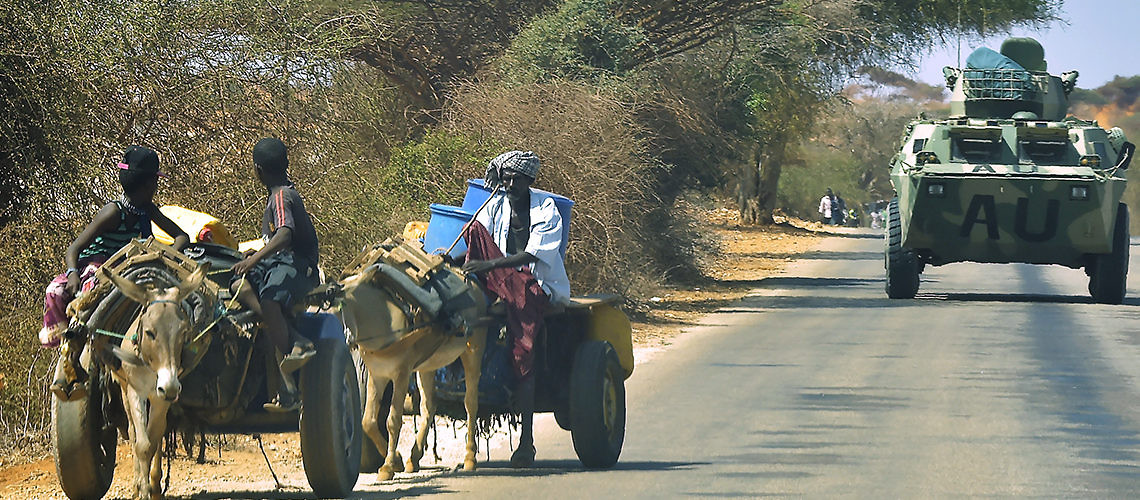An African Union peacekeeping force patrols the streets of Kismayo as local residents pass by. Somalia, November 15, 2016. (Simon Maina/AFP/Getty Images)
This week’s deadly al-Shabaab attacks on a Mogadishu hotel and Kenyan troops attached to an African Union peacekeeping mission are a reminder that the militant group’s influence across Somalia owes much more to its strategy of capitalizing on clan and political grievances than to the appeal of its jihadist ideology.
The assault on the Dayah Hotel on Wednesday, for which al-Shabaab claimed responsibility via several affiliated websites and which killed at least 28 people and wounded scores more, comes as various political factions and clans and their supporters horse trade over the identity of Somalia’s next president, with an election now postponed five times and expected to be decided on February 8.
The hotel violence was a direct attack against Somalia’s political process, with elders and recently elected MPs—mainly of the Rahanweyn clan, more specifically their Digil-Mirifle sub-clans—based there and conducting election-related meetings with various dealmakers and high-profile officials.
On Friday, the al-Qaeda-aligned extremists claimed to have killed more than 50 Kenyan Defense Force soldiers and seized military vehicles and weapons from a base in Kulbiyow, southern Somalia. The KDF, however, issued a brief press statement that they “repulsed the terrorists, killing scores” and that an “intensive pacification operation” was under way.
Both attacks show al-Shabaab is far from a spent force and has the ability to outmaneuver the Somali government and its international partners. A key lesson to be learned from these events is that al-Shabaab will not be defeated solely on the battlefield, but via political engagement that stifles the group’s ability to operate in the gaps of the fragile state’s security architecture.
Al-Shabaab’s new strategy, which has steadily morphed into a kind of “composite insurgency,” is that the group appropriates and exploits clans and sub-clans’ grievances for its own purposes. The result is a patchwork of different communities that support, tolerate, or collude with the group to varying degrees but for largely parochial reasons and lacking in any meaningful common purpose.
Although al-Shabaab’s rank and file are from all clans, as well as foreign fighters, they have always skillfully appropriated local grievances, aligning with marginalized communities. A recent two–part Al Jazeera interview with group spokesman Sheikh Ali Dheere, posted on the Somali site Dalsoor and YouTube, confirmed this new approach.
Dheere’s explicit acknowledgement of the role of clan in Somali society exposed al-Shabaab’s fresh thinking. It also pre-positioned the jihadists as an insurgent “safety net” for clans that feel cheated or disenfranchised by the outcome of Somalia’s ongoing electoral process. His comments on clan, which he characterized as a necessary part of Somali life consistent with the teachings of the Prophet Mohammed, and a social support network, were the interview’s most significant statements.
In the past, al-Shabaab has officially tried to cast itself as a movement that transcends the clan system, and that following Islam is the one true path. In recent years, however, this fiction has become increasingly difficult to sustain. As Stig Jarle Hansen, associate professor at the University of Life Sciences in Oslo and author of al-Shabaab in Somalia, told me: “There is a contradiction in Shabaab. If you want to survive in Somalia you need to play the clan game, and Shabaab is doing it. The problem is, they have to pretend that they don’t because of their Islamist credentials,” he said.
As al-Shabaab’s fight became asymmetric, the group embraced clans as a centerpiece of its strategy. The tactical acceptance, or manipulating and opportunistic support, of clan differences and associated political grievances across Somalia has become vital to survival as territory has been lost due to military intervention from the likes of Kenya and Ethiopia. The group’s military wing, the Jaysh al-Usra, routinely calls upon the support of friendly clan militias that it refers to as al-Ansar, meaning “the helpers.” The announcement, in October 2016, that it had established a “congress of clan leaders” represented a particularly remarkable volte-face on past strategy.
At the same time, al-Shabaab has engaged in increasingly overt intimidation of specific clans, employing alternating cycles of violence and negotiation to maneuver them into the jihadist fold. Its forces have inflicted collective punishment against these clans: killing community members, confiscating livestock, and threatening forced displacement unless they come to the bargaining table. To avoid punishment, clan elders must swear allegiance to al-Shabaab and their fighters must enlist in the jihadist cause.
All of this comes as Somalia’s electoral model continues to be fraught with implementation difficulties, including widespread allegations of vote-buying, intimidation, and fraud. The United Nations and other international partners have accused Somalia’s National Leadership Forum– a joint body of the Somali federal government and emerging federal member states—of having extended “a blanket amnesty for some of the most blatant irregularities witnessed during this electoral process” and for contravening the commitment to respect the rule of law.
The principal message of the recent interview from Dheere, who last gave an international media interview in December 2013, appears to discredit the transition to a new government and to position al-Shabaab as a potential ally for any discontents of the process. He reaffirmed al-Shabaab’s rejection of any compromise on peace and sought the total defeat of the “apostate” Somali government. To drive the point home, Dheere also restated al-Shabaab’s repudiation of constitutional rule, electoral democracy and, implicitly, any leadership role for Somali women.
Any election produces winners and losers, and al-Shabaab will be determined to exploit the outcome of the upcoming poll, ushering the disgruntled into its camp and inciting them to take up arms. On the other hand, a representative, inclusive, and reasonably legitimate political process will starve al-Shabaab of the injustices and political oxygen upon which it thrives. Whether or not the forthcoming presidential election, and the government it produces, are capable of seizing this opportunity remains to be seen.
Ilya Gridneff is a Senior Researcher at Sahan Research, Nairobi.





